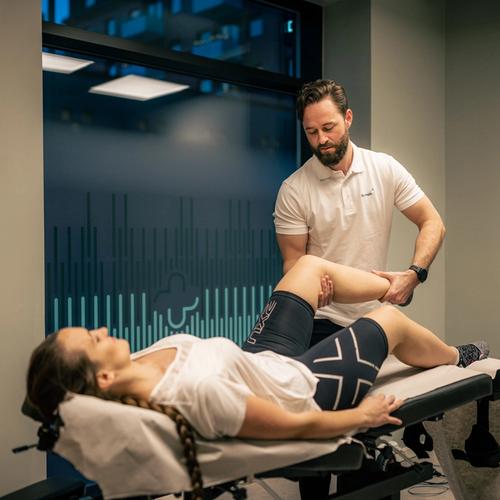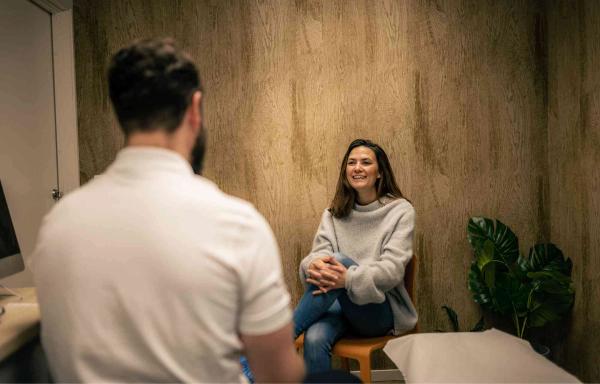Runner's knee
Runner's knee is a condition that affects the outside of the knee. It usually occurs as a result of overuse, such as in running. Runner's knee often leads to pain and stiffness in the iliotibial band on the outside of the knee, and the pain is often aggravated during repetitive movements or when climbing stairs.
At Dr. Dropin, we have skilled practitioners who can assess your knee pain and help you receive the appropriate treatment.
See availability
What are you looking for?
Symptoms of runner's knee
If you have runner's knee (patellofemoral pain syndrome), you may experience one or more of the following symptoms:
- Pain on the outside of the knee.
- Pain that often worsens during activities like running, cycling, or walking downhill (on stairs or slopes).
- Stiffness on the outside of the knee.
- Possible swelling around the knee area.
- Pain that can limit your ability to participate in sports activities or perform daily tasks.
Runner's knee is a condition that can develop gradually, and the symptoms can vary in intensity. It is important to seek professional guidance for an accurate diagnosis and treatment if you experience these symptoms.
See availability
Treatment and prognosis
The treatment of runner's knee often involves various approaches to achieve specific treatment goals. Here are some common treatment methods.
- Pain relief: Through manual techniques like joint adjustments, massage, and trigger point therapy, pain in the knee area can be reduced.
- Increased flexibility: Specific stretching exercises and techniques can help improve the flexibility of the iliotibial band and surrounding areas.
- Strength training: Gradual introduction of strength exercises for the muscles around the knee can enhance stability and support for the knee.
- Biomechanical evaluation: Analysis of running technique and potential adjustments to footwear or orthotics to reduce stress on the iliotibial band.
- Functional rehabilitation: Gradually resuming running and other daily activities, with a focus on restoring optimal knee function.
It's important to understand that the treatment for runner's knee should be tailored to individual needs and may vary from person to person. A thorough evaluation and close collaboration with an experienced physiotherapist or chiropractor are crucial for developing an effective treatment plan.
See availabilityWhen should you book an appointment?
If you recognize the symptoms above and are experiencing any of the following issues, we recommend seeking professional guidance:
- Pain or reduced mobility that has persisted for more than a week without improvement.
- Severe symptoms that you need assistance in reducing quickly.
- Symptoms that cause you concern or that you believe may be due to more serious conditions.
Remember that early assistance from a therapist can reduce the duration of your issues and contribute to achieving the best possible outcome. You should never worry that your problems are "too small" - we take all types of issues seriously.
See availability
Find clinic and therapist

Find therapist
Find a therapist that suits you and your needs by filtering on one or more criteria.

Telephone
Authorized healthcare personnel assist you over the phone. We answer the phone within 60 seconds. Free of charge.
Use your health insurance
We cooperate with all the major insurance companies, so that you can use your health insurance with us if you have knee pain or other problems.
Read more about how to use your health insurance here
What can you do by yourself?
Although treatment for runner's knee (iliotibial band syndrome) typically involves professional guidance and therapy, there are several measures you can take to alleviate symptoms and improve your condition:
- Follow recommended exercises: If you have been prescribed home exercises by your therapist, it's important to perform them regularly.
- Continue to be active: Do not completely stop jogging. If you can jog short distances without experiencing pain, this is usually acceptable.
- Pain relief: Pain can sometimes be reduced by using an ice pack, heating pad, a warm shower, or by performing gentle movements.
- Medications: Use over-the-counter pain relievers as directed by healthcare professionals.
- Adjust activities: Avoid activities that lead to prolonged worsening of knee pain (more than 12 hours).
- Maintain good communication with your therapist: So that the treatment plan can be adjusted to any changes you experience.
If you have not yet had the condition examined or have deviated from the treatment plan, it is recommended to contact healthcare professionals for further guidance.
See availabilityFrequently asked questions about runners knee
What is runner's knee?
Runner's knee, also known as iliotibial band syndrome (ITBS), is a condition that causes pain on the outside of the knee and can result from overuse of the iliotibial band.
What is runner's knee?
Runner's knee, also known as iliotibial band syndrome (ITBS), is a condition that causes pain on the outside of the knee and can result from overuse of the iliotibial band.
What are the causes of runner's knee?
Causes of runner's knee can include overuse, poor running technique, improper footwear, and muscle weaknesses in the hips and thighs.
What are the causes of runner's knee?
Causes of runner's knee can include overuse, poor running technique, improper footwear, and muscle weaknesses in the hips and thighs.
How is runner's knee treated?
Treatment for runner's knee may include physical therapy, strength training, stretching, pain management, and adjustments to running technique. In some cases, medical consultation may be necessary.
How is runner's knee treated?
Treatment for runner's knee may include physical therapy, strength training, stretching, pain management, and adjustments to running technique. In some cases, medical consultation may be necessary.
Can I continue running with runner's knee?
In most cases, you can continue running, but it may be necessary to adjust your training intensity and technique to avoid pain and strain.
Can I continue running with runner's knee?
In most cases, you can continue running, but it may be necessary to adjust your training intensity and technique to avoid pain and strain.
How long does it take to recover from runner's knee?
The time it takes to recover from runner's knee varies depending on the severity and how consistently you follow the treatment plan. Some may experience improvement in a few weeks, while others may take longer.
How long does it take to recover from runner's knee?
The time it takes to recover from runner's knee varies depending on the severity and how consistently you follow the treatment plan. Some may experience improvement in a few weeks, while others may take longer.